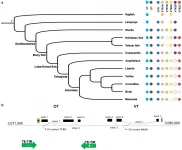(Press-News.org) WASHINGTON, D.C., (April 28, 2021) - Two new studies, presented today as late-breaking clinical science at the Society for Cardiovascular Angiography & Interventions (SCAI) 2021 Scientific Sessions, provide new treatment insights for cardiogenic shock (CS) patients. A study of the SCAI cardiogenic shock stages consensus document confirms the accuracy of the shock classification. In addition, an analysis of the National Cardiogenic Shock Initiative demonstrates use of a shock protocol emphasizing early use of mechanical circulatory support may lead to improved survival for patients with CS.
CS is a rare, life-threatening condition in which the heart stops pumping enough blood to supply the vital organs of the body, and is the most common cause of death in patients with acute myocardial infarction (AMI). Despite advancements in pharmacological, mechanical and clinical interventions, the overall in-hospital mortality rate for patients with CS is 39%. For patients 75 years and older, the mortality rate increases to 55%.
Analysis of SCAI Shock Stages Consensus Statement
A 2019 joint SCAI consensus statement proposed a new classification system describing the stages of CS, from A to E, to standardize classification of the disease. To understand if the SCAI shock stages provide mortality risk classification, an analysis of studies in PubMed was conducted examining clinical outcomes.
Researchers identified 14 manuscripts of more than 15,000 patients presenting with CS, cardiac arrest (CA) or those admitted to the cardiac intensive care unit. The studies examined seven separate definitions of the SCAI shock stages, and each study demonstrated a stepwise increase in short-term (in-hospital or 30-day) mortality with each higher SCAI shock stage.
Findings show mortality varying across shock stage (A, 1-5%; B, 0-34%; C, 11-54%; D, 24-68%; E, 42-77%) and increased with additional risk factors including the presence of CA, systemic inflammation, poor hemodynamics, worsening shock and older age.
"These findings confirm the efficacy of the SCAI shock stage classification, allowing physicians a staged approach to communicate with their colleagues and the broader heart team how sick a patient is in a very consistent way," said lead researcher Jacob Jentzer, MD, critical care specialist, Mayo Clinic. "Our analysis should enhance physician confidence in the protocol to appropriately identify high-risk and low-risk patients, ultimately helping tailor therapy based on level of shock to improve patient outcomes."
Final Update to the National Cardiogenic Shock Initiative
The National Cardiogenic Shock Initiative, a single-arm, prospective, multi-center study assessing outcomes of early mechanical circulatory support (MCS) in acute myocardial infarction and cardiogenic shock (AMICS) in patients treated with percutaneous coronary intervention (PCI), reveals improved survival rates when using early MCS.
Between July 2016 and December 2020, 73 sites enrolled 406 patients with AMICS who were treated using a standard protocol emphasizing invasive hemodynamic monitoring and early initiation of MCS. The average patient age was 64 (±12 years), 24% were female and 67% were admitted in shock.
Results found that early use of MCS and invasive hemodynamics is associated with an increased patient procedural survival (99%), survival to discharge (79%), survival to 30-days (77%), and survival to 1-year (62%) for patients presenting in stage C/D shock and 98%, 49%, 46%, 32% for patients in stage E shock (p=0.01).
"Cardiogenic shock is the leading cause of death in heart attack patients and outcomes have not improved over the past two decades," said lead author Babar Basir, DO, director of acute mechanical circulatory support at Henry Ford Health System in Detroit, MI. "With early use of MCS coupled with hemodynamic monitoring we have the potential to increase survival to 80%, and save 20,000 life per year in the United States."
Study investigators call for further research to build on their findings and connect best practices for different stages of CS. With additional data, researchers hope to provide a benchmark for clinicians to use when treating CS patients, ultimately standardizing care.
INFORMATION:
About SCAI:
The Society for Cardiovascular Angiography and Interventions is a professional organization representing more than 4,000 invasive and interventional cardiology professionals in approximately 75 nations. SCAI's mission is to promote excellence in invasive/interventional cardiovascular medicine through physician education and representation, and advancement of quality standards to enhance patient care.
For more information about the SCAI 2021 Scientific Sessions, visit https://scai.org/scai2021. Follow @SCAI on Twitter for the latest heart health news and use #SCAI2021 to follow the latest discussions.
WASHINGTON, D.C, (April 28, 2021) - An analysis of the prospective Fuwai PCI Registry, confirms long-term dual antiplatelet therapy (DAPT) is an optimal treatment option for acute coronary syndrome patients (ACS) following a percutaneous coronary intervention (PCI). The study shows long-term DAPT reduces ischemic events without increasing bleeding or other complications as compared to short-term DAPT treatments. The study was presented today as late-breaking clinical research at the Society for Cardiovascular Angiography &Interventions (SCAI) 2021 Scientific Sessions.
Following ACS, patients have a high risk of ischemic events, which impacts chances of survival. Patients are predisposed for blood clots ...
Chinese scientists have made direct observations in face-centered cubic VCoNi (medium)-entropy alloys (MEA) and for the first time proposed a convincing identification of subnanoscale chemical short-range order (CSRO). This achievement undisputedly resolves the pressing question of if, what and why CSRO exists, and how to explicitly identify CSRO.
This work, published in Nature on April 29, was conducted by Prof. WU Xiaolei from the Institute of Mechanics of the Chinese Academy of Sciences (CAS) in collaboration with Prof. MA En's team from Xi'an Jiaotong University and Prof. ZHU Jing's team from Tsinghua University.
Multi-principal element alloys--also known as high (medium)-entropy alloys (HEAs/MEAs)--are a hot and frontier topic in multidisciplinary fields. In these ...
Oxytocin and arginine vasopressin are two hormones in the endocrine system that can act as neurotransmitters and regulate -in vertebrates and invertebrates- a wide range of biological functions, such as bonding formation, breastfeeding, birth or arterial pressure. Biochemists in the pregenomic era, named these genes differently in different species, due to small protein coding differences.
A new study carried out by the University of Barcelona (UB) and the Rockefeller University, published in the journal Nature, has analysed and compared the genome of 35 species representing ...
Researchers have discovered an explanation for why cerebral cavernous malformations (CCMs)--clusters of dilated blood vessels in the brain--can suddenly grow to cause seizures or stroke. Specifically, they found that a specific, acquired mutation in a cancer-causing gene (PIK3CA) could exacerbate existing CCMs in the brain. Furthermore, repurposing an already existing anticancer drug showed promise in mouse models of CCMs in improving brain-vascular health and preventing bleeding into the brain tissue.
Previous studies linked the initial formation of CCMs to various environmental factors, including ...
The degree of acidity or alkalinity of a substance is crucial for its chemical behavior. The decisive factor is the so-called proton affinity, which indicates how easily an entity accepts or releases a single proton. While it is easy to measure this for molecules, it has not been possible for surfaces. This is important because atoms on surfaces have very different proton affinities, depending on where they sit.
Researchers at TU Wien have now succeeded in making this important physical quantity experimentally accessible for the first time: Using a specially modified atomic force microscope, it is possible to study the proton affinity of individual atoms. This should help to analyze catalysts on an atomic scale. The results have been published in the scientific journal Nature.
Precision ...
COLUMBUS, Ohio - Tiny molecules called nanobodies, which can be designed to mimic antibody structures and functions, may be the key to blocking a tick-borne bacterial infection that remains out of reach of almost all antibiotics, new research suggests.
The infection is called human monocytic ehrlichiosis, and is one of the most prevalent and potentially life-threatening tick-borne diseases in the United States. The disease initially causes flu-like symptoms common to many illnesses, and in rare cases can be fatal if left untreated.
Most antibiotics can't build up ...
ATLANTA--Processed diets, which are low in fiber, may initially reduce the incidence of foodborne infectious diseases such as E. coli infections, but might also increase the incidence of diseases characterized by low-grade chronic infection and inflammation such as diabetes, according to researchers in the Institute for Biomedical Sciences at Georgia State University.
This study used mice to investigate how changing from a grain-based diet to a highly processed, high-fat Western style diet impacts infection with the pathogen Citrobacter rodentium, which resembles Escherichia coli (E. coli) infections in humans. The findings are published in the journal PLOS Pathogens.
Gut microbiota, the microorganisms living in the intestine, provide a number of benefits, ...
The scientific community is focusing its research into the multiple applications of Hydrogels, polymeric materials which contains a large amount of water, that have the potential to reproduce the features of biological tissues. This aspect is particularly significant in the field of regenerative medicine, which since a long time has already recognised and been using the characteristics of these materials. In order to be used effectively to replace organic tissues, hydrogels must meet two essential requirements: possessing great geometric complexity and, after suffering of a damage, being ...
Researchers at the University of Bath investigating how virtual reality (VR) can help improve balance believe this technology could be a valuable tool in the prevention of falls.
As people grow older, losing balance and falling becomes more common, which increases the risk of injury and affects the person's independence.
Falls are the leading cause of non-fatal injuries in over 65-yearolds and account for over 4 million bed days per year in England alone, at an estimated cost of £2 billion.
Humans use three ways of keeping their balance: vision, proprioceptive (physical feedback from muscles and joints) and vestibular system (feedback from semi-circular canals in the ear). Of these, vision is the most important.
Traditional ways of assessing balance ...
RESEARCH TRIANGLE PARK, N.C. -- New Army-funded synthetic biology research manipulated micro-compartments in cells, potentially enabling bio-manufacturing advances for medicine, protective equipment and engineering applications.
Bad bacteria can survive in extremely hostile environments -- including inside the highly acidic human stomach--thanks to their ability to sequester toxins into tiny compartments.
In a new study, published in ACS Central Science, Northwestern University researchers controlled protein assembly and built these micro-compartments into different shapes ...



